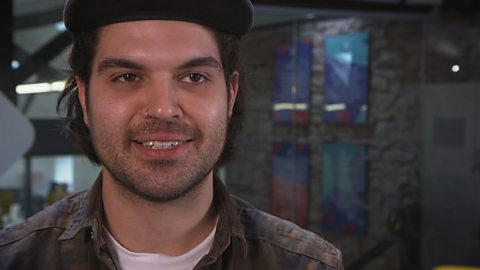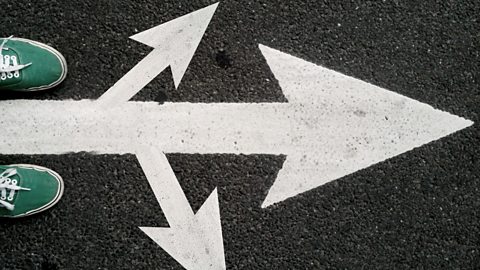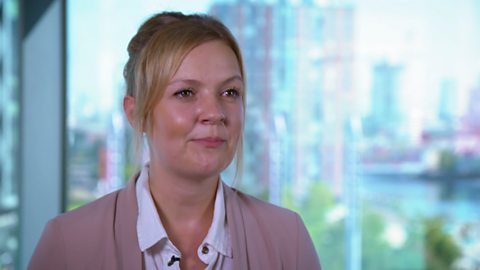Meet Mona and find out about her life as a researcher at the BBC. Part of our Bitesize world of work series.
Mona Ansari-Beni - Researcher
My job is to research different things for a project. So at the moment. I'm working on a music campaign and we're trying to make teaching resources
for primary school teachers. And for that we need talent to promote the resources. So I’ll look into different talent, think about the target audience - so that’s teachers and that’s children – so what kind of Talent would they be interested in? And also I’ll help up with shoots, for example, if we’re going to record this Talent, they’ll need equipment, they’ll need locations… so I’ll look into that. At GCSE I was pretty much an all-rounder, did OK at everything. Then at A-levels I kind of did a mix, so I did two sciences, and English Lit and History.
I was OK at all of them again, and then got to this stage where you’ve got to choose what you want to do and I always just had no idea what I wanted to do. And then I remember the thing that made me realise that I wanted to do media is, I got my iphone and I just starting using imovie and made these like stupid little music videos, but I really enjoy doing it. The whole filming it, just doing silly little shots, I was doing stop motion but just moving them slightly myself. It was just really fun, I thought, you know what, I could actually do this for a job.
Special skills that I need to do my job is definitely good communication. Whilst I’ve worked at the BBC I've worked at different teams, different sizes of teams, different people and you always need to really adapt yourself to work within the team and communication is so important. I always ask them what they want, how they want it. What best way of formatting they want, because at the end of the day you’re trying to help each other, so it's always really good to speak to each other.
I think my advice would be for anyone who wants to come and work in media is to just ask. You don't really get if you don't ask and I found my way through asking people to do some work experience, or to do shadowing and even when I'm still working here, I want to experience different parts of the BBC, so I’ve always asked, could I shadow this person in radio, or could I come here and just see what you do.
And then once you get in this industry, I think my biggest advice would be just to say yes, and really get yourself out of your comfort zone, because that's where all the best things happen. I really like working at the BBC, and I remember the day I was sitting to wait, for my interview and I saw someone go in, and I thought, oh my God, they’re just… that's cool, I think I really want to work here. And when I started I just really found it just such a proud place to work. Everyone is so helpful. Everyone is so friendly, and I really like working for something that I believe in.
I really like working for something that I believe in.
- Mona’s job is to research things for specific projects – that can include coming up with ideas, thinking about the target audience, booking guests, and arranging locations and equipment for filming
- Mona did a mix of A-levels, including two sciences, English Literature and History. She didn’t really know what she wanted to do, until she got her smartphone and began editing music videos and playing around with stop motion. That made her think about working in the media
- Mona says good communication and speaking to one another is really important for her job. She regularly works across different teams and wants to make sure she understands what different people need
- Her advice for anyone wanting to come and work in the media is to ask around and get lots of work experience. Once you get into the industry, Mona says just say yes and get out of your comfort zone, because that’s where all the best things happen!

What to expect if you want to be a media researcher
- Media researcher average salary: £16,000 to £40,000 per year
- Media researcher typical working hours: 38 to 40 hours per week
What qualifications do you need to be a media researcher?
You could get into this role via a university course, a college course (such as a Level 2 or Level 3 Diploma, or a T-level in Media, Broadcast and Production - England-only, from Sept 2023), an apprenticeship, work towards the role, apply directly if you have relevant experience, or training courses through a professional body.
Sources: LMI for All, National Careers Service, GOV.UK
This information is a guide and is constantly changing. Please check the National Careers Service website for the latest information and all the qualifications needed and the GOV.UK website for more on T-levels.
For careers advice in all parts of the UK visit: National Careers Service (England), nidirect (Northern Ireland), My World of Work (Scotland) and Careers Wales (Wales).

Work experience in your area
Find work experience placements with Workfinder.
Tips and advice
Help with interviews, writing a CV and all things work experience related.

Liam: digital content producer. video
Meet Liam who's a digital content producer at Skiddle.

Careers A to Z: Find your perfect job
From actor to zoologist, find the right fit for you.

Jennifer: senior research manager. video
Meet Jennifer who's a senior research manager at the BBC.
